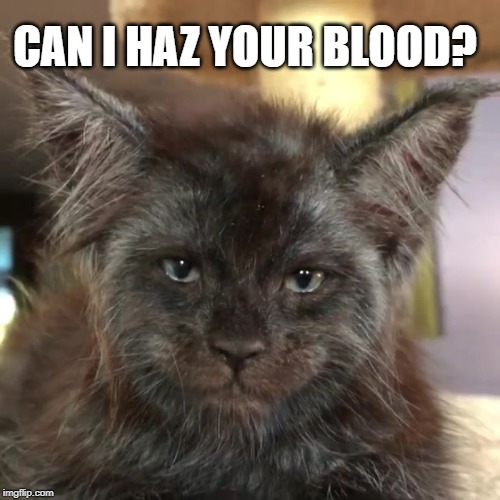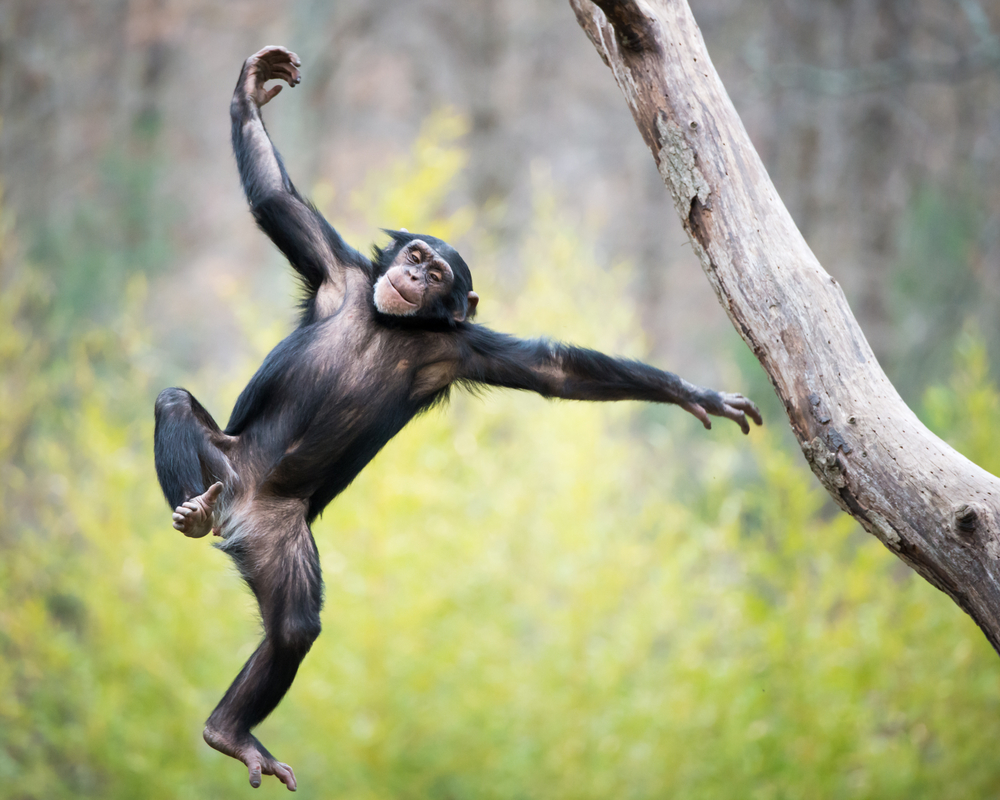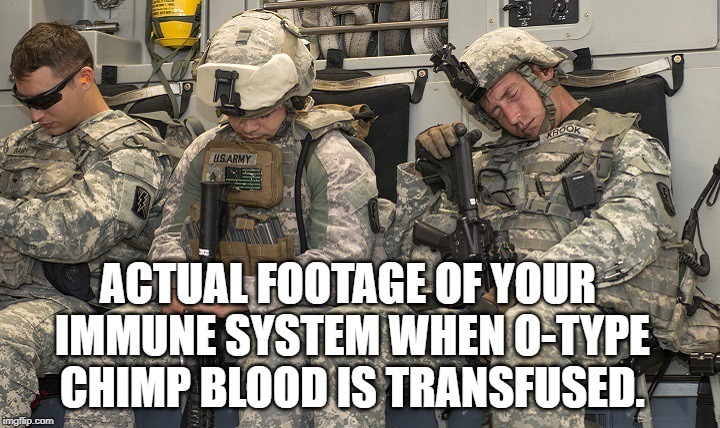Table of Contents (click to expand)
Chimpanzees and bonobos possess about 98.7% of the same DNA makeup as human beings. Despite our obvious differences in physical appearance, our genetic makeup is nearly identical, which is why the question of potential blood transfusions between our species is so interesting.
For many people, the idea of opening up a vein and giving away their blood—one of the most precious personal resources we possess—is something they simply don’t want to do. On the other hand, if you’ve ever been in need of a blood transfusion, perhaps after an accident or injury, then you know how critical it is to have an adequate supply of donated blood. Not that this needs to be said, but it is quite literally the difference between life and death!
Now, the demand for donated blood is rarely satisfied, if ever, so a number of innovative solutions have been proposed throughout history. Dating all the way back to the 17th century, doctors and researchers were exploring the idea of transferring blood between non-human animals and people, as well as between non-human animals of different different species.

The question is, was this an impossible dream by Renaissance-era researchers? Or can humans receive blood from other animals? More specifically, given our intimate evolutionary history linking us to great apes, can we receive blood from chimpanzees?
The Science Of Blood
When you cut yourself and see a drop of blood well up, you are probably more annoyed than mesmerized, but blood is a rather remarkable thing. More importantly, particularly for this discussion, not all blood is created equal. Every individual on the planet has a certain blood type, which is a means of classifying blood into groups based on whether the surface of a person’s red blood cells possess indicative antigens or antibodies. Different blood groups can form blood group systems, representing an effective method for categorization. There are many different blood types—more than 300, in fact—as well as 36 different blood group systems.
These specific antigens can come in various different forms on the red blood cells, and they function as signals for the body’s immune system. This is not unique to blood cells, but also to every cell in your body, which helps your immune system target the proper cells when seeking foreign or potentially harmful substances/growths. In the case of blood cells, there are two main blood group systems used in classification for humans—the ABO system and the Rh system.

The ABO system is what determines a person as having the A antigen, the B antigen, both antigens or neither antigen. If you have the A antigen on your red blood cells, then your body will have the Anti-B antibody; similarly, if you have the B antigen, then your immune system will have the anti-A antibody. If your blood has both the A and B antigen (blood type AB), then your body will have neither antibody. Finally, if you have the O blood type, it means that neither antigen is present on the blood, and thus will have both antibodies in their blood.
There is also the Rh blood group system—named after the Rhesus monkeys whose blood revealed a similar blood antigen to human beings. There are nearly 50 different Rh antigens, but this second blood group system is slightly simpler than the ABO system, yet still adds an extra level of accuracy and sensitivity when donating or transfusing blood between humans. If a person has an Rh(D) antigen on their red blood cells, they will be classified with a (+) beside their ABO classification. If a person’s red blood cells lack an Rh(D) antigen, then they will have a (-) next to their ABO category. Thus, the 8 blood types found in human beings are as follows—A+, A-, B+, B-, AB+, AB-, O+ and O-.
One of these blood types, O-, is particularly sought after, and these people are often called universal donors, as their blood can be used by anyone. If the red blood cells lack any AB antigens, and also lack an Rh(D) antigen, than there won’t be any negative reactions by the immune system of the body. For this reason, if you do have O- blood, donating regularly is a beneficent thing to do, as your blood is the most versatile and “valuable”, per se.

On the opposite side of the spectrum are those people with an AB+ blood type; they are nicknamed universal recipients, and can receive blood from anyone, since they don’t have anti-A or anti-B antibodies, nor do they have antibodies for the Rh antigen.
Also Read: Why Do Humans Have Different Blood Types?
Can Humans Receive Blood From Chimps?
As you may know, chimpanzees and bonobos possess about 98.7% of the same DNA makeup as human beings. Despite our obvious differences in physical appearance, our genetic makeup is nearly identical, which is why the question of potential blood transfusions between our species is so interesting.

Xenotransfusion is the process of transferring the blood of one species into the veins of another, and while there are a significant amount of ethical considerations to be made regarding this, it is possible to do it successfully—in very limited situations.
If you have every seen a chimpanzee in a movie donating its blood to humans, or vice-versa, this isn’t completely fiction. As mentioned above, the ABO blood group system is critical for humans, but it is also present in chimpanzees and other Old World monkey species. At a certain point in our evolutionary history, our paths diverged, which means that some of our genetic similarities began to erode, including the precise compatibility between blood groups.
Although a full explanation of this goes beyond the scope of this article, the ABO blood group system is found widely, but the A and B antigens are not necessarily identical across species. Therefore, the risk of complications or rejection by the recipient’s immune system is much higher, unless the donated blood group from chimpanzees is O. The A and B antigens may have moved forward, evolutionarily speaking, to make it harder for compatibility with humans, but if the antigens are absent from the red blood cells (i.e., blood type O), then a human immune system will have no impetus to snap into defensive action.

Xenotransfusion is not a widely pursued field, but when it comes to animals you can potentially swap blood with, chimpanzees aren’t actually the best choice! Despite being our closest evolutionary relatives, the blood of pigs is actually a better match for human beings than chimps and great apes. The porcine antigens of the ABO blood group system are more easily matched with humans, and are less likely to cause a rejection or immune response. There is a good reason why heart valves from pigs have been used in transplants to humans—a far lower likelihood of being rejected! The red blood cells of pigs are similar in size, volume and life cycle length to humans; their genes can also be manipulated to close the gap and make their blood even more compatible with humans!
Also Read: In Case Of A Mishap, Can Your Pet’s Blood Be Donated To Another Animal?
A Final Word
While it is possible to use chimpanzee blood in certain extreme situations, it will have to be O-type blood. Donating human blood to chimpanzees has been far less studied, and is not believed to be a viable procedure. If humans are looking for a viable source for blood when our supply is running low, we may want to shift away from our chimpanzee cousins and instead look to the pig sty!
How well do you understand the article above!

References (click to expand)
- Human Blood: Rh Blood Types. Palomar College
- Do primates have similar blood types to humans? - ABC. The Australian Broadcasting Corporation
- Introduction to the Rh Blood Group.pdf. The University of Utah
- Ape-to-human, pig-to-human blood donations. geneticliteracyproject.org
- Bonobos Join Chimps as Closest Human Relatives - Science. sciencemag.org
- Wang, Z.-Y., Martens, G. R., Blankenship, R. L., Sidner, R. A., Li, P., Estrada, J. L., … Tector, A. J. (2017, March). Eliminating Xenoantigen Expression on Swine RBC. Transplantation. Ovid Technologies (Wolters Kluwer Health).
- Deschamps, J.-Y., Roux, F. A., Sai, P., & Gouin, E. (2005, March). History of xenotransplantation. Xenotransplantation. Wiley.
